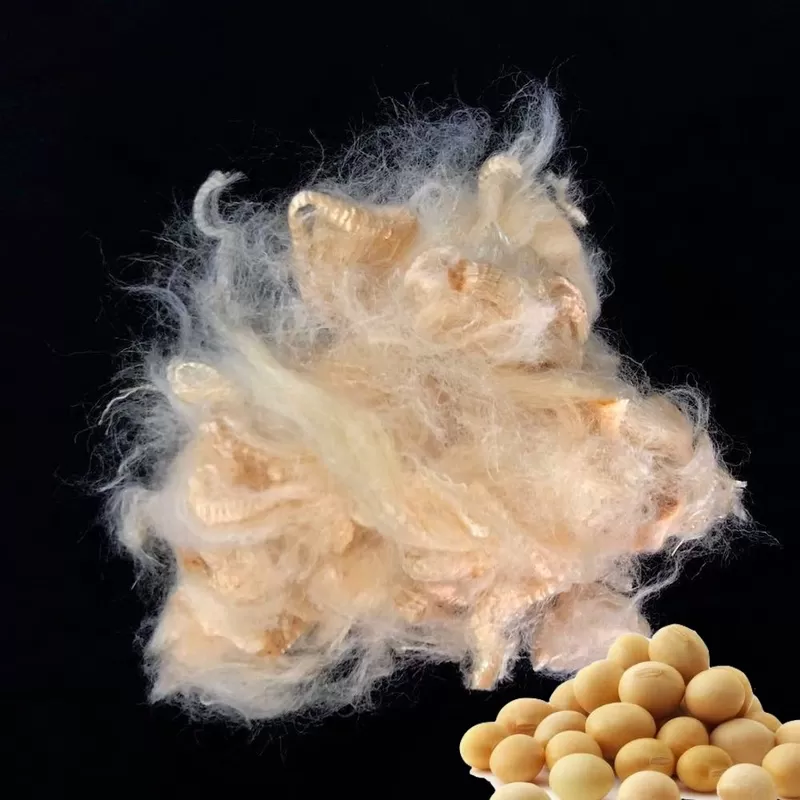1. A New Era for Sustainable Textiles
Soybean Protein Fiber is revolutionizing the eco-friendly fabric industry by combining advanced technology with renewable resources. Unlike synthetic fibers made from petrochemicals, soybean protein fiber is derived from natural soybean meal, a by-product of soybean oil production. This not only reduces waste but also creates a biodegradable, skin-friendly fiber ideal for clothing, home textiles, and more. As the global market shifts toward sustainable solutions, Suzhou Makeit Technology Co., Ltd. is at the forefront of this transformation, delivering eco-friendly fibers that meet the highest quality standards.

2. What is Soybean Protein Fiber?
Soybean protein fiber is a plant-based fiber extracted from soy protein through advanced processing and spinning technologies. It has a silky texture, excellent moisture absorption, and breathability, making it comparable to silk and cashmere in comfort. Because it’s derived from renewable resources, it leaves a much smaller carbon footprint compared to conventional materials like polyester.
Makeit’s soybean protein fiber is manufactured under strict OEKO-TEX STANDARD 100, ITS, SGS, and GRS certifications, ensuring it meets global safety and environmental standards. This guarantees that every meter of fiber is not only high-performing but also safe for people and the planet.
3. Key Advantages of Soybean Protein Fiber
1) Skin-Friendly Comfort
Its smooth surface and natural amino acids make it gentle on the skin, perfect for sensitive users.
2) Excellent Moisture Control
The fiber quickly absorbs and releases moisture, keeping fabrics fresh and breathable.
3) Strong Yet Soft
It offers a balance of durability and softness, making it ideal for both fashion and functional textiles.
4) Eco-Friendly and Biodegradable
Unlike petroleum-based fibers, soybean protein fiber naturally decomposes without releasing harmful substances.
5) Versatile Applications
From luxury apparel to bedding, it can be blended with cotton, wool, or silk for enhanced performance.
4. Applications in the Fabric Industry
The versatility of soybean protein fiber makes it a rising star in multiple industries:
-
Fashion Apparel – High-end dresses, shirts, underwear, and sportswear that require softness and moisture management.
-
Home Textiles – Bedsheets, pillowcases, curtains, and blankets for a sustainable lifestyle.
-
Blended Fabrics – Mixed with cotton or wool to combine eco-friendly features with durability and style.
-
Industrial Textiles – Certain medical and wellness products that benefit from its hypoallergenic properties.
Suzhou Makeit’s production capability, with an annual capacity of 50,000 tons, ensures a stable supply for large-scale orders, meeting the needs of global clients in Southeast Asia, Europe, and America.
5. Why Brands are Switching to Soybean Protein Fiber
Global fashion and textile brands are under increasing pressure to reduce their environmental impact. With soybean protein fiber, they can offer customers a sustainable alternative without sacrificing comfort, quality, or style. Compared to polyester, it uses less energy in production and avoids the release of microplastics into waterways.
Makeit works closely with clients to customize fiber specifications for different applications, ensuring optimal performance while staying within sustainability goals. This partnership approach allows brands to innovate and stand out in the competitive textile market.
6. The Role of Suzhou Makeit Technology in Sustainable Innovation
Founded in 2007, Suzhou Makeit Technology has grown from a leading polyester staple fiber manufacturer to a pioneer in eco-friendly fiber solutions. The company’s shift toward plant-based materials like soybean protein fiber reflects its commitment to green innovation.
With its in-house factory, Changshu Meijie Chemical Fiber Co., Ltd., Makeit controls the entire production process—from raw material sourcing to fiber finishing—ensuring consistent quality, timely delivery, and competitive pricing for B2B clients.
7. Looking Ahead: The Future of Eco-Friendly Fabrics
As consumers become more environmentally conscious, the demand for sustainable textiles will continue to rise. Soybean protein fiber is positioned to be one of the most promising materials in this shift, offering a balance of eco-friendliness, comfort, and performance.
By investing in cutting-edge R&D and maintaining strict quality standards, Makeit is ready to support brands, designers, and manufacturers in adopting soybean protein fiber at scale. This not only helps reduce environmental impact but also meets the growing demand for premium, sustainable products.
8. Conclusion
Soybean Protein Fiber is revolutionizing the eco-friendly fabric industry by offering a sustainable, comfortable, and versatile alternative to traditional textiles. Suzhou Makeit Technology’s commitment to innovation, quality, and environmental responsibility ensures that this plant-based fiber is more than just a trend—it’s a long-term solution for a greener future. As brands and manufacturers embrace soybean protein fiber, the fabric industry moves closer to achieving true sustainability.
www.makeitfiber.com
Suzhou Makeit Technology